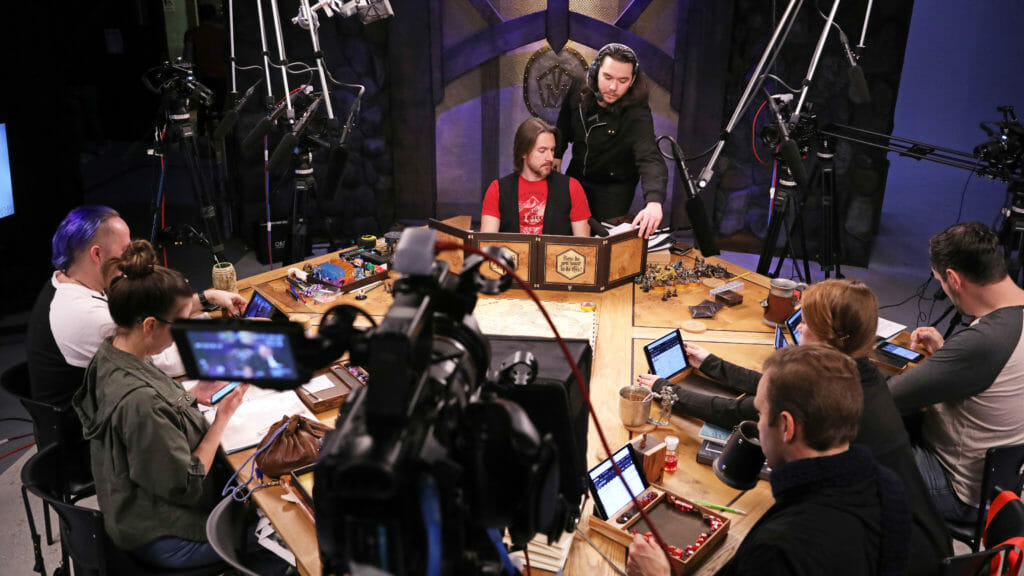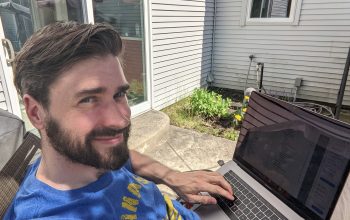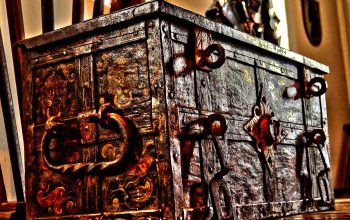
My good friend and fellow gamer David send me this link to a show called “How to be a Great Gamemaster”, at a specific point where the host is talking about adapting your game to the players’ actions. He proposed the idea that this is de rigueur for modern gamers, that there is an expectation that the DM is there to serve the tastes of the player. What were my thoughts?
Well, I certainly agree with him that it’s a good topic for the Wandering DMs to cover, but I also wanted to think about it out loud a little here first. In fact, I found myself reacting to an awful lot in that video, and generally not in a very positive light. The software he’s showing us makes me groan, which in turn makes me want to talk about how we go about game prep in general, but let’s start with a grounding in the question David asks — what is the DM’s role? Are they the director of a film, a concierge / tour guide there to show the players a good time, or just one more player of a game with a slightly different role than the others?
I’d argue strong for the last choice. In a video game metaphor – imagine that everyone at the table is playing single multiplayer game together, but the DM’s game is more like an RTS, while the players are playing an FPS. The DM’s view is a mile back, while the player’s view is nose-in. The DM is thinking many turns, days, even game-weeks ahead, while the players are wondering what their character had for breakfast. Ultimately though, we’re still all playing a game together, and I think the DM should get as much enjoyment out of the experience as any other player. The DM is not there to direct the players or to entertain the players, but rather to take an active role in playing with game mechanics and building a shared world and story with everyone else.
Now sure, everyone, DM included, is performing for the rest of the table a little bit. Every time we make a funny voice or crack a joke, we’re performing to the rest of the table. And of course this totally gets amped up if you’ve got cameras and/or microphones at the table. But I’d argue this is just a detail, an aspect of play like rolling dice or making tactical combat choices, which while sometimes fun is not the core of anyone’s purpose at the table.
In general, I think as DM between games I should be acting more like a scientist than an author. I am there to make sure the world follows the natural laws governing it and that the NPCs behave in a way true to their character. If the players are tracking down where the orc raiders came from, then I should think about the orcs’ motivations and prior actions, and create reasonable content – here is their cave, here is how their leadership is structured, and here’s how they’d react to certain world events such as a powerful party of humans invading their lair.
I should not be thinking things like “here’s a scene where they get ambushed on the road” and “here’s the big climax scene where they discover the orc boss is controlled by a demon overlord.” Those details can all be true — the orcs may raid the road and their actions may ultimately be directed by a demon, but I can create that content without necessarily dictating or assuming how the players will interact with it. Likewise, I should be ready to chuck much of that out the window when the players decide instead to travel to the next town over and avoid the orcs completely.
I’m not saying you should chuck your hard-created material simply because the players weren’t interested in it, and you’re the servant of their entertainment. But rather you should be ready to adapt the world and the content you create to the actions of the players – because frankly that’s the fun part! Seriously, as DM what I enjoy the most is watching the players do something unexpected and then being presented with the challenge of figuring out how that effects the word and the NPCs in it. Then I can take appropriate action and serve the ball back to the players, and thus we go back and forth playing the game.
For example, perhaps the players do avoid the orcs and move on to the next town. Well then, I guess there’s nobody to defend the trade along that road and the orcs grow rich raiding it. Maybe the demon then orchestrates an invasion on the town they left behind. “Oh no, Old Town has been completely raised by an orc horde! We’re next!” cry the locals in New Town. What do the players do now? Do they continue to flee? Do they organize a raid on the now enemy occupied Old Town? The latter sounds like a really fun adventure, and guess what, I’ve already prepped half of it when I made that orc lair last week. I know how many orcs there are, I know how they’re organized, and I know where their commands are coming from. I even know the goals of that command, and can therefore start to imagine what would happen if a carefully orchestrated strike took out the orc boss. All I have to do now is map out some city locations and reseat some encounters at these new interesting locations.
Maybe along the way I invent a new encounter — a band of resistance fighters hiding in the cellar of an old tavern. Maybe they players will encounter them and maybe they won’t, but either way I just introduced a new interesting group of NPCs into my world. Next week I’ll be thinking about what the players did in their raid on Old Town, and how that affects the band of resistance fighters, and what they may do about it. But that’s as far as I’m going to let myself think about that, because again I’m not trying to create “scenes” of content that rely on specific outcomes. I’m creating characters, documenting their goals and resources, and then through play deciding what becomes of them.
Anyway, those are my thoughts on that. Does it sound like I have plot and strong story beats? I’d argue I love that stuff, but that I expect that to be the outcome of play, not the set up. I want to play with my players to discover the exciting story of the world we share equal parts in forming.



Oh this is so funny! I posted my referee thesis two days ago. And we agree on most things.
Thanks, as usual great work.
The DM is a player. He has asymmetrical info and controls the enemies, but is not an opponent.
The most important (but not only) function of the DM at the table is to manage the rules and make sure they’re working. I would call this engineering rather than science but we mean the same thing.*
Story is not what you the DM puts in, but what the several players (including the DM) get out.
You’re not an author, but maybe more like a journalist or documentarian.
It’s really cool to see someone else express a complex thought better than I can. Thanks.
*so much so that I have put together an almost-entirely procedurally generated world engine that i can bring to the table. It’s pretty cool what you can do if you prep systems rather than stories.
I think you nailed it there with your closing statement.
I think the authorial impulse is the biggest hang up for many modern GM’s (and to a large degree for players too). It’s essentially the mirror of the “character with extensive backstory” issue. This is how railroads get built. This is how hard feelings flare up around the table.
Stories from games should be emergent.
When a person crafts a story, by its nature it kinda *has* to go a certain way. They have a beginning, middle, and ending in mind and can be disappointed if it doesn’t turn out as they envisioned. As I often say, if you’re a GM or a player, if you want to create the whole story, write a damn novel.
This is a game. The process is different. You make up the beginnings and drop the characters into them, but the middles and endings are supposed to happen organically around the table.
I have always equated the DM/GM to the host of a party (probably because we always played at the GMs/My house). So there is a bit on an extra responsibility to facilitate the enjoyment of your guests/players, but its your party too and you also get to have fun.
As for prep, yeah i like to just build a sandbox and let hem loose, mostly because I find it easier to prep that way. If the world is what it is, and does what it does, then I don’t have to spend more time trying to craft a moment. But that said, once things progress to a point, I will throw in some crafted moments now and again to take advantage of “Character Work”
For the rest, I fall back to my, there are many flavors/recipies of D&D, and it’s important for everyone at the table to understand what’s being served (and hopefully its a flavor everyone enjoys)
I have had folks drop out because my table was not tactical enough (Pathfinder player), and others because it was not performative enough (Critical Roll Viewer).
Thank you for this post, it made realize some things I had never been able to define.
I read this a few days ago and just got around to putting down my thoughts in a blog post ( https://42ducktape.blogspot.com/2019/08/why-i-dm.html ) TL:DR I treat DMing as a strategy game, I like to plan and calculate and then have my plans disrupted and have to make moment to moment decisions in reaction to changing circumstances.
Glad you enjoyed it. Definitely reacting to player actions is one of the real joys of DMing, especially when they do something completely unexpected. Dan and I will be discussing this in more depth this Sunday at 1 PM on our show Wandering DMs – please join us!